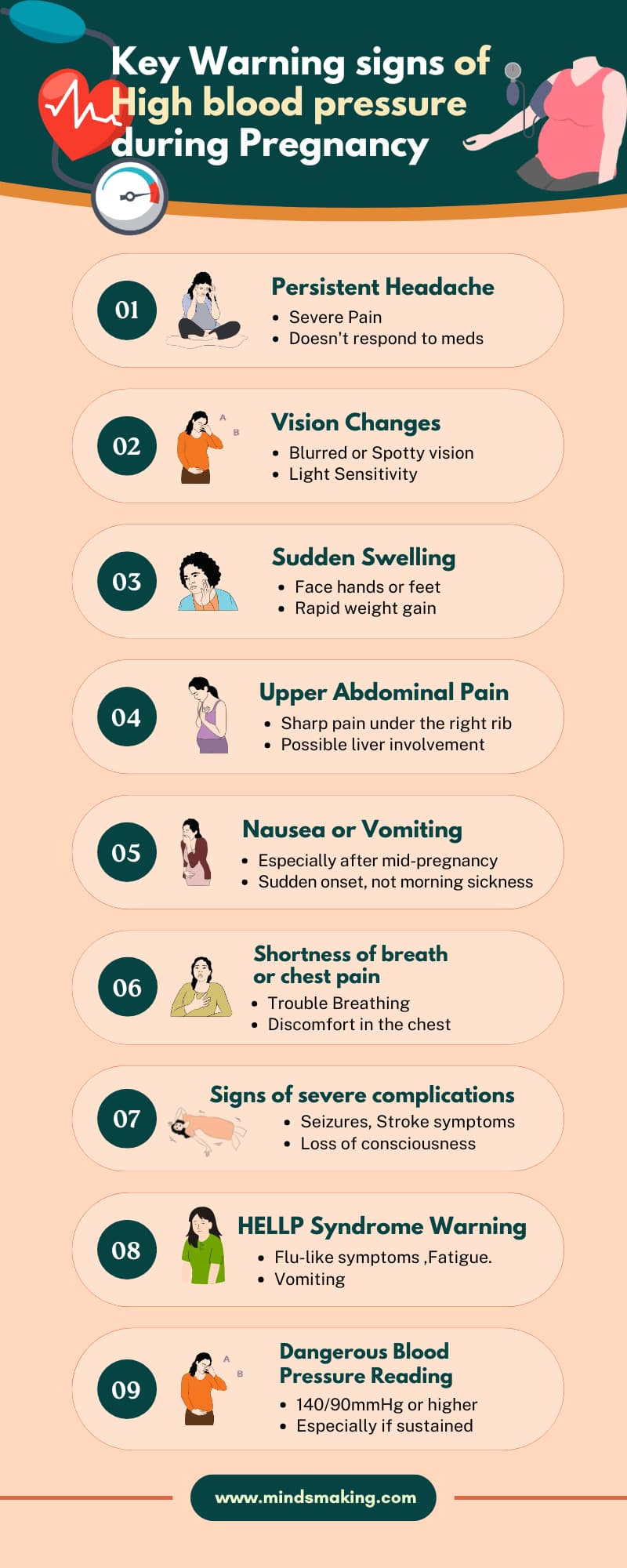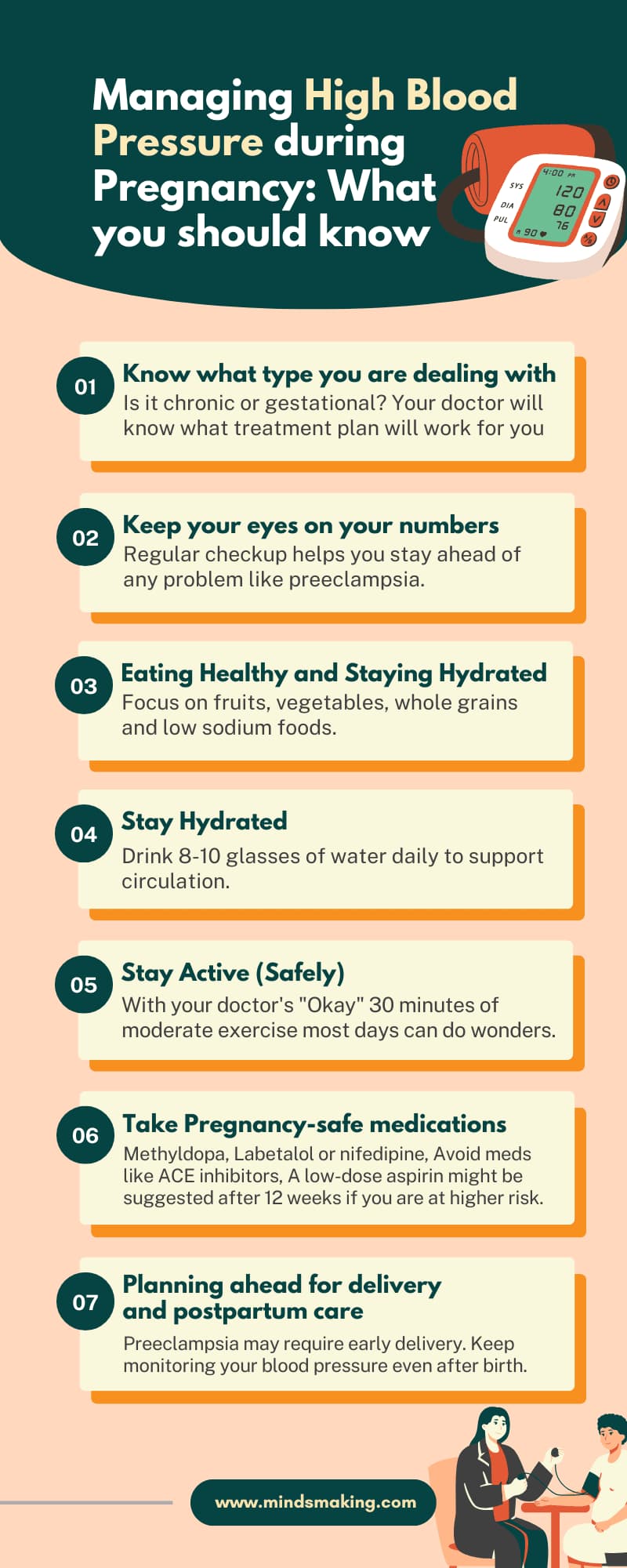Hypertension During Pregnancy
prostock studio

Written by Mindsmaking Medical Writer
Fact Checked by Mindsmaking Professionals
3rd, June, 2025
High blood pressure during pregnancy can put both you and your baby at risk, but early detection and the right care can make all the difference. Knowing how to spot warning signs and manage complications can protect you and your baby's health.
High blood pressure during pregnancy can lead to serious problems for both the mother and baby. It affects about 6–8% of pregnancies in the United States and includes different conditions like gestational hypertension, preeclampsia, and chronic hypertension.[1]
These disorders are some of the most serious pregnancy complications and can cause health issues for both mother and baby(1). It increases the risk of heart problems, seizures, coma, premature birth, and even death.
With early detection, proper medication, and the right care, hypertension in pregnancy can be managed effectively. In more severe cases, like preeclampsia, close monitoring or hospitalization may be necessary to protect both you and your baby.
Key Takeaways
High blood pressure, also known as hypertension, is when the force of blood against the walls of the arteries becomes too strong.
The normal blood pressure during pregnancy is less than 120/80.
Four types of hypertensive conditions can occur during pregnancy: chronic hypertension, chronic hypertension with superimposed preeclampsia, gestational hypertension, and preeclampsia.
Many risk factors can contribute to the development of high blood pressure during pregnancy, including lifestyle habits, genetics, medical conditions, medications, and social and economic factors.
High blood pressure during pregnancy often shows no symptoms, but warning signs like severe headaches, vision changes, swelling, or upper right abdominal pain can signal serious complications and need urgent care.
Women with chronic hypertension during pregnancy have a 20–25% chance of developing superimposed preeclampsia, making regular blood pressure monitoring and fetal kick counts essential throughout the pregnancy.
What Is Hypertension During Pregnancy?
Hypertension in pregnancy means having high blood pressure during pregnancy. It is diagnosed when your blood pressure is 140/90 mmHg or higher, measured on two separate occasions at least 4 hours apart. There are different types, depending on when it happens:(15)(2)
- Chronic hypertension (before 20 weeks or pre-existing),
- Gestational hypertension (after 20 weeks, no proteinuria),
- Preeclampsia (after 20 weeks, with proteinuria or organ dysfunction),
- Severe preeclampsia (more serious features, often with severe BP).
Severe hypertension in pregnancy is a blood pressure reading of 160/110 mmHg or higher. This will require you to be treated until your reading is below 160/110 mmHg.
Hypertension in pregnancy puts too much pressure on organs in the body and can lead to serious complications like stroke, kidney failure, and heart attack.(12)
High blood pressure can affect the flow of blood to the baby, which might lead to low birth weight, early delivery, or other serious problems.
This is why keeping your blood pressure in check during pregnancy is important, as it helps you catch any abnormalities early.
What Is Normal Blood Pressure in Pregnancy?
According to the American College of Cardiology, normal blood pressure is less than 120/80 mmHg(3). This means your heart is pumping blood well, and there is no extra stress on your body.(4)
Blood pressure is measured in millimeters of mercury (mmHg). It consists of two numbers: the systolic pressure, which is the top number, and the diastolic pressure, which is the bottom number. The top number, which is the systolic, shows the force of blood against the artery walls when your heart beats (contracts to pump blood), and the bottom number, known as the diastolic, shows the pressure when your heart rests between beats. For example, in a reading of 120/80, 120 is the systolic and 80 is the diastolic.(4)
If your blood pressure is around 130/85 or higher, it might be a warning sign. It's not always dangerous right away, but it could become a problem if it stays high. Readings above 140/90 are considered high and should be checked by a doctor. They may want to monitor you more closely to keep you and your baby safe.(24)
If the systolic blood pressure is over 160 and the diastolic pressure is over 110, you should go to the hospital immediately, as these readings can cause seizures or stroke.(7)
Types of High Blood Pressure In Pregnancy
Dr. Errol Norwitz, an obstetrician, president, and CEO of Newton-Wellesley Hospital, shares his knowledge on the different types of high blood pressure during pregnancy, including chronic hypertension, chronic hypertension with superimposed preeclampsia, gestational hypertension, and preeclampsia.
Chronic Hypertension
This is high blood pressure that existed before Pregnancy or was diagnosed before 20 weeks. This type of high blood pressure usually doesn’t go away after birth. It persists after 12 weeks postpartum, and you might not notice any symptoms, which is why regular checkups are important. Chronic hypertension can increase the risk of developing preeclampsia.
A recent study suggests that women with pre-pregnancy hypertension should be treated with blood pressure medication during pregnancy to maintain blood pressure below 140/90 mmHg, even if their readings are not severely high.
This is a shift from the previous conventional practice of only treating those with readings above 160/110 mmHg. The study found that women who were treated on time had fewer complications.(16)
Gestational Hypertension
Also known as pregnancy-induced hypertension, it is a type of high blood pressure that occurs for the first time after 20 weeks of gestation in women who had normal blood pressure before. Women with gestational hypertension have only a small increase in blood pressure. There are no signs of organ damage or protein in the urine, which are usually checked for when looking for preeclampsia. This condition often goes away after birth, but about 50% of women with gestational hypertension will develop preeclampsia. (8)(2)
Hypertension With Superimposed Preeclampsia
This happens when a woman who already had high blood pressure before pregnancy then develops signs of preeclampsia after 20 weeks. This is more dangerous than having just one of the conditions, and it raises the chances of serious problems for both the mother and the baby.
Preeclampsia
Preeclampsia is a more serious condition that also starts after 20 weeks of pregnancy. In addition to high blood pressure, it includes signs of problems in other organs, especially the kidneys and liver. It often causes protein in the urine, and sometimes symptoms like headaches, blurry vision, or pain in the upper stomach. (14)
If Preeclampsia gets worse, it can lead to seizures (eclampsia) or a condition called HELLP syndrome, which affects the liver and blood cells. Preeclampsia can be very dangerous for both mother and baby if not treated. (8)
In all cases, early diagnosis and regular prenatal care are key to keeping both you and your baby safe.
What Causes High Blood Pressure In Pregnancy?
According to the National Institute of Health, many risk factors can contribute to the development of high blood pressure during pregnancy. One of such is unhealthy lifestyle habits. A healthy lifestyle can lower your risk of developing high blood pressure. (17)
Other causes and risk factors include:
Family History & Genetics: If high blood pressure runs in your family, you may be more likely to develop it during pregnancy. Some people also inherit a sensitivity to salt, which can cause their blood pressure to rise more easily(22). In addition, research suggests that certain changes in a baby’s DNA while in the womb may increase their risk of developing high blood pressure later in life. (6)
Medical Conditions & Medications: Certain health issues, such as kidney disease, thyroid problems, or metabolic syndrome, can affect your body’s ability to control blood pressure. Some common medications, including antidepressants, NSAIDs like ibuprofen, and hormonal birth control, can also contribute. (19)
Race & Ethnicity: High blood pressure is more common and often more severe in Black women, especially during pregnancy. They are also more likely to develop preeclampsia. The reasons are complicated and often tied to genetics and unequal access to healthcare and support. (17)
Social & Economic Factors: Where you live, your job, income, education level, and even childhood experiences can impact your risk. Working night shifts, dealing with financial stress, or growing up in a tough environment can all contribute to long-term blood pressure issues.
Gestational diabetes mellitus and high blood pressure often coexist. Insulin resistance, common in gestational diabetes mellitus, can contribute to endothelial dysfunction and vascular stress, which can lead to increased blood pressure.
Women with both gestational diabetes mellitus and high blood pressure have a higher risk of developing type 2 diabetes and hypertension later in life. Lifestyle habits like poor diet, lack of physical activity, being overweight, smoking, or drinking can all contribute to high blood pressure. (11)
Uncontrolled high blood pressure can lead to several complications, like
- Preeclampsia and Eclampsia. Life-threatening conditions affecting multiple organs.
- Placental Abruption. Premature separation of the placenta from the uterine wall can be fatal to both you and your baby.
- Preterm Birth. Where your baby has to be delivered early to prevent worsening complications.
- Intrauterine Growth Restriction (IUGR). High blood pressure can restrict the flow of nutrients and oxygen to the baby.
- Increased Risk of Cardiovascular Disease. Both mother and child are at higher risk of heart problems later in life.(13)(4)
Read This Next
No posts available
Warning Signs Of High Blood Pressure That Should Never Be Ignored?
According to Stanford Medicine, each woman may experience symptoms of high blood pressure differently. These symptoms include increased blood pressure, protein in the urine, swelling (edema), and pain in the right upper abdomen or around the stomach. (23)
High blood pressure most times does not come with noticeable symptoms, but preeclampsia and other hypertensive disorders during pregnancy can present several warning signs:
- Severe or persistent headaches. These may not be relieved by typical over-the-counter medications.
- Visual disturbances. These include blurred vision, seeing spots, or sensitivity to light.
- Swelling (edema). Sudden swelling of the face, hands, or feet, especially if accompanied by rapid weight gain.
- Upper abdominal pain, particularly under the ribs on the right side, may indicate liver involvement.
- Nausea or vomiting, especially if it occurs suddenly after mid-pregnancy.
If the hypertension comes with pre-eclampsia or eclampsia, you may experience(25):
- Seizures
- Stroke
- Coma
If it comes with HELLP syndrome, you are likely to experience:
- Flu-like feeling
- Fatigue or weakness
- Abdominal or chest pain, including abdominal or chest tenderness and upper right side pain from liver distention
- Vomiting.
If you present with any of these symptoms, do not hesitate to call your doctor and go to the hospital immediately.
mindsmaking

How to Manage and Treat High Blood Pressure
Dr. Harsha V. Reddy, a Consultant Obstetrician and Gynecologist at Cloudnine Hospital, shares her insights on how to treat hypertension during pregnancy. She explains that the treatment of hypertension during pregnancy depends on the kind of hypertensive disorder.
If you have chronic hypertension, you’ll usually continue taking any medication you were on before pregnancy, as long as it’s considered safe. If not, your doctor will switch you to a safer alternative.
Next, organs like the eyes and heart, as well as the functioning of the kidneys, are checked to see which ones could have been affected by the increase in blood pressure.
Your blood pressure is monitored because women with chronic hypertension have a 20 to 25% chance of developing superimposed preeclampsia. The baby is also monitored, and you will be asked to keep a daily count of your baby's kicks.
Doctors usually aim to keep blood pressure below 120/80 and 160/105 mmHg. If it goes higher, treatment is usually started. You will have regular checkups to track your blood pressure and the baby’s health. In some cases, low-dose aspirin might be recommended from 12 weeks onward to lower the risk of preeclampsia if you are at high risk. (9)
If preeclampsia happens late in pregnancy, early delivery may be needed. If it happens early, doctors weigh the risks of early birth against keeping the pregnancy longer. After birth, blood pressure will still be checked, as problems can continue or start postpartum. (24)
With the right care and treatment plan, most women with high blood pressure can have a healthy pregnancy and baby.
Certain risk factors, such as genetics or a health condition, cannot be changed in the treatment of hypertension during pregnancy. Still, there are things you can do to reduce other risk factors. It is important to understand this during pregnancy and when planning to conceive.
Some of the steps you can take include:
Maintaining a Healthy Weight and Diet
Consult your doctor about the recommended weight gain and weight limit to help keep your weight within a healthy range. For a healthy diet, prioritize foods rich in potassium, calcium, and magnesium, such as fruits, vegetables, nuts, whole grains, legumes, fish, and vegetable oils.
Avoid salty foods, including canned goods and processed foods high in sodium. Always stay hydrated, aim for at least 8 to 10 glasses of water daily. It goes a long way. (18)
Be Physically Active
ACOG recommends 30 minutes of moderate exercise several days a week. It can offer benefits such as decreased risk of developing gestational diabetes, risk of cesarean birth, postpartum recovery time, and risk of postpartum depression. (20)
Doctors may prescribe medications that are safe for pregnancy. Common options include methyldopa, labetalol, and nifedipine. Some medications, like ACE inhibitors and ARBs, should be avoided because they can harm the baby(5).
mindsmaking

Frequently Asked Questions
Can high blood pressure during pregnancy go away after birth?
Yes, high blood pressure that develops during pregnancy, also known as gestational hypertension, usually goes away after childbirth. However, women who have had high blood pressure during pregnancy may have an increased risk of developing hypertension or heart disease later in life.
What foods help lower blood pressure naturally while pregnant?
Foods that are rich in potassium, calcium, and magnesium, including fruits, vegetables, nuts, whole grains, legumes, fish, and vegetable oils.
How early can preeclampsia be detected in pregnancy?
Preeclampsia is typically detected after 20 weeks of pregnancy. While it can develop as early as 20 weeks, most cases occur in the third trimester (after 27 weeks). Some cases even develop after delivery, known as postpartum preeclampsia.
Is it safe to exercise if I have high blood pressure during pregnancy?
Yes, moderate exercise such as walking or swimming is generally safe and can even be beneficial for pregnant women with high blood pressure. Still, it's important to consult with your doctor before starting or continuing any exercise program. Regular physical activity can help manage blood pressure, reduce the risk of complications like pre-eclampsia, and improve your overall health during pregnancy.
What are the risks of untreated hypertension in pregnant women?
If hypertension is left untreated during pregnancy, it can lead to several complications, including preeclampsia, placental abruption, preterm birth, fetal growth restriction, and, in extreme cases, can lead to death of both the mother and baby.
Difference between pregnancy-related high blood pressure and regular hypertension?
The difference between pregnancy-related high blood pressure and regular hypertension is seen in the timing of its onset, severity, and complications. Pregnancy-induced hypertension, also known as gestational hypertension, develops at 20 weeks after gestation and goes away after childbirth. And it increases the risk of hypertension later on in life, but regular hypertension or chronic hypertension is high blood pressure that existed before pregnancy or was diagnosed before 20 weeks.
Can I still have a healthy pregnancy with high blood pressure?
Yes, you can have a healthy pregnancy even if you have high blood pressure, especially if you’re closely monitored and treated.
Does high blood pressure mean I’ll need a C-section?
Not really. If your blood pressure is well controlled and stays within safe levels during labor, you can still have a vaginal birth. However, if you develop severe hypertension, your medical team may monitor you more closely and might recommend interventions like forceps, ventouse, or a C-section to ensure a safe delivery for you and your baby.
Was this article helpful?
How many stars are you giving this article?
Leave a comment
Your email address will not be published.









































